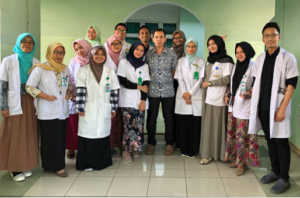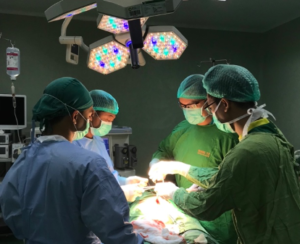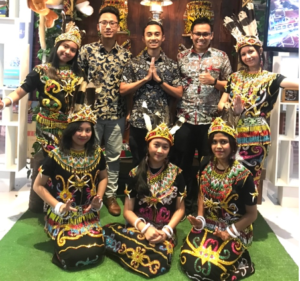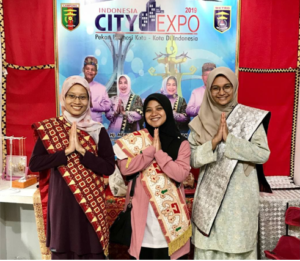 The COVID-19 pandemic has taught us to appreciate the things we had before the virus emerged. For me, this includes my experience in 2019 where I went to Indonesia for my elective posting, which was the last time I crossed outside the Malaysian border.
The COVID-19 pandemic has taught us to appreciate the things we had before the virus emerged. For me, this includes my experience in 2019 where I went to Indonesia for my elective posting, which was the last time I crossed outside the Malaysian border.
When I was a fifth year medical student in Universiti Sains Islam Malaysia (USIM), I, along with ten of my batchmates, grabbed the opportunity to do our elective posting in Universiti Sultan Agung (UNISSULA) which was located in Semarang, the capital and largest city of Central Java province in Indonesia. UNISSULA is one of the leading Islamic university in Indonesia with its own private hospital, Rumah Sakit Islam Sultan Agung (RSI), which is the first Syariah-friendly hospital in Indonesia. We were posted to two hospitals for clinical attachment. They were Rumah Sakit Islam Sultan Agung (RSI), a multicenter specialist university hospital and Rumah Sakit Wira Bhakti Tamtara (RST), a military hospital.
Throughout the one-month elective attachment, we were divided into 3 groups and rotated between 3 departments; Surgery, Internal Medicine, and Obstetrics and Gynecology. The Indonesian clinical students there were treated as housemen, along with the associated responsibilities, such that their clinical students were called ‘coass’, an abbreviation for “co-assistant”. We too were treated as their coass and had oncall every other day as well as oncall report presentations. We were lucky enough to have one day off every Sunday to visit the places in Semarang, unlike the clinical students there who had to go to the hospital every single day.
 Exhanging knowledge
Exhanging knowledge
We participated in ward rounds, did procedures, clerked cases, and performed physical examinations. We also joined classes conducted by the Indonesian lecturers. We took the chance to exchange knowledge and methods of teaching and learning with our counterparts. In operation theatre, we were able to assist the surgeons and observed surgeries up close. Interestingly, students there were expected to assist for almost every operation. We took turns to assist the surgeons there. The experience was so vivid that one of my friends even passed out while assisting a nephrectomy case. Luckily, the staff in the operation theater managed to catch him before he fell to the floor and then carried him outside the operation theater. As medical students in Malaysia, we usually had to request to assist the surgeon, and would be lucky to if we could assist as these roles were usually reserved for the medical officers and housemen. Besides the ward, we would often be posted to the emergency department for our oncall, where we assumed the responsibilities of housemen. We had to take note of every patient that came in; do history taking, measure vital signs, perform physical examinations and take blood samples before referring the patients to the doctors on duty. Unlike back in Malaysia where we don’t usually spend overnight in the hospital, we stayed overnight at the hospital every other night for our oncalls. Rooms were provided where students can take turn sleeping. We were also responsible to do patients’ review and assessment in the ward at 5pm and 5am daily.
 Cultural Exchange
Cultural Exchange
We were the first USIM medical students to attend clinical elective in UNISSULA under an MoU agreement. The male students stayed at a cardiologists’ house, who was also a lecturer at UNISSULA. The female students stayed at a midwifery lecturer’s house. They hosted us like family. We befriended their students who guided us throughout our clinical attachment in their hospital. They also became our translator and tourist guide. They brought us to visit their historical and cultural places in Semarang. Communication barrier was a big challenge because most of the people here speak in Java but as time goes by, we were able to communicate using basic phrases in Java language. We learnt their tradition and customs, ate local food and delicacies, and participated in their cultural events like Java wedding ceremony and Eid celebration. Coincidentally, a cultural exposition was held in city of Semarang to promote different cities from all over Indonesia. We donned traditional attires and ate traditional food at the exposition which were distinct to each Indonesian city.
 Islamic Environment
Islamic Environment
During our attachment in Semarang, we were guided to start every procedure with basmalah and end it with tahmid to the extent that the patients can hear it and utter it together with us. Their university hospital was built together and connected to a mosque.The male staff and students were highly encouraged to pray in the congregation and the women were also welcomed. Another interesting thing students were strongly discouraged from performing procedures that involved the genital area for men, and the chest and genital area for women if they were of the opposite sex. Healthcare workers of the same gender as the patient were highly preferred to perform procedures involving these sensitive body areas. I remembered being told by a female nurse not to assist a male nurse who was inserting a urinary catheter on a male patient.
Conclusion
Ultimately, it was a bittersweet, tiring but definitely wonderful experience which broadened our horizons and networking. I am reminded of my supervisor’s words, “get out of your comfort zone and see the world. There’s always something to learn”. I look forward to visiting the friends I made in UNISSULA someday. I strongly recommend other students to grab the opportunity to do their elective abroad, should the opportunity presents itself. If not in the near future, maybe some day when the COVID-19 pandemic is under control.
About the author:
Nour Hanan Daniah binti Mohd Bakhit is a recent medical graduate from Universiti Sains Islam Malaysia (USIM) and currently waiting for housemanship placement
